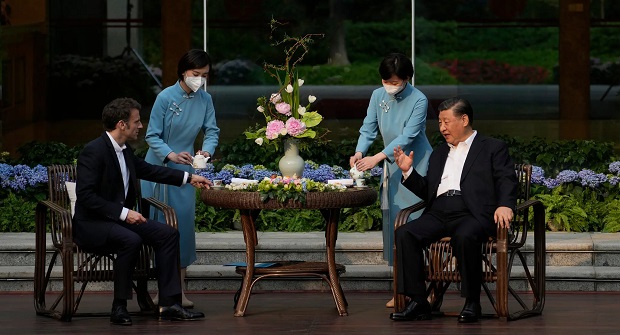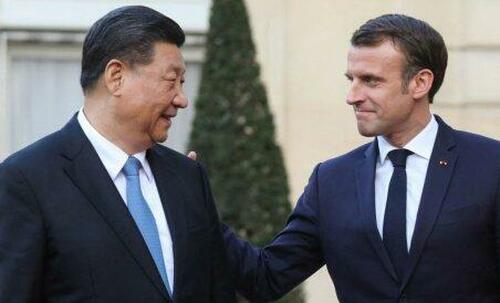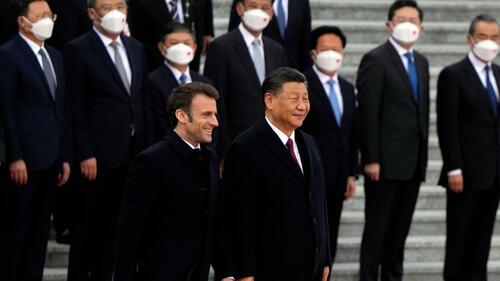BOMBSHELL – MACRON, BACK IN PARIS AFTER HISTORIC MEETING WITH XI, TELLS EUROPE TO STOP BECOMING ‘VASSALS’ OF AMERICA – CUT DEPENDENCE ON U.S. DOLLAR & SEEK ‘STRATEGIC AUTONOMY’ TO BECOME A ‘THIRD SUPERPOWER’ – ‘GREAT RISK [FACING EUROPE RIGHT NOW IS THAT IT] GETS CAUGHT UP IN CRISES THAT ARE NOT OURS, WHICH PREVENTS IT FROM BUILDING ITS STRATEGIC AUTONOMY,’ SAYS MACRON
Macron Says Europe Should Reduce Dependence On US Dollar, Seek ‘Strategic Autonomy’
As the United States combats a recent flood of countries ‘de-dollarizing‘ – trading commodities in other currencies, the last thing that was needed was French President Emanuel Macron amplifying this message.
After spending around six hours with Chinese President Xi Jinping as part of a three-day state visit to China, Macron made extremely clear that France wants nothing to do with WWIII, emphasizing that Europe must employ “strategic autonomy,” presumably led by France, to become a “third superpower,” according to Politico.
While speaking with reporters aboard COTAM Unité, France’s Air Force One, the French President said that the “great risk” facing Europe right now is that it “gets caught up in crises that are not ours, which prevents it from building its strategic autonomy.”
This isn’t the first time Macron has suggested reducing dependence on the US. In November, the French President called for a “single global order” while discussing the power interests of Russia and China and the threat of war.
“We are in a jungle and we have two big elephants trying to become more and more nervous,” he said.
“If they become very nervous and start a war, it will be a big problem for the rest of the jungle. You need the cooperation of a lot of other animals, tigers, monkeys and so on,” added Macron.
China agrees
Macron’s concept of strategic autonomy was ‘enthusiastically endorsed’ by Xi and the CCP, who have been focusing on the notion that the West is in decline while China rises, and that weakening the transatlantic relationship will accelerate this trend.
“The paradox would be that, overcome with panic, we believe we are just America’s followers,” said Macron. “The question Europeans need to answer … is it in our interest to accelerate [a crisis] on Taiwan? No. The worse thing would be to think that we Europeans must become followers on this topic and take our cue from the U.S. agenda and a Chinese overreaction.”
Just hours after his flight left Guangzhou headed back to Paris, China launched large military exercises around the self-ruled island of Taiwan, which China claims as its territory but the U.S. has promised to arm and defend.
Those exercises were a response to Taiwanese President Tsai Ing-Wen’s 10-day diplomatic tour of Central American countries that included a meeting with Republican U.S. House Speaker Kevin McCarthy while she transited in California. People familiar with Macron’s thinking said he was happy Beijing had at least waited until he was out of Chinese airspace before launching the simulated “Taiwan encirclement” exercise. -Politico
Macron’s submissive statements come after he and Xi ‘intensely’ discussed Taiwan, according to French officials who accompanied the president.
That said, European Commission President Ursula von der Leyen, who accompanied Macron, said she stressed stability in the region, telling Xi during their meeting last Thursday in Beijing that “The threat [of] the use of force to change the status quo is unacceptable.”
According to the report, Xi responded by calling anyone who thought they could influence the CCP on Taiwan was deluded.
“Europeans cannot resolve the crisis in Ukraine; how can we credibly say on Taiwan, ‘watch out, if you do something wrong we will be there’? If you really want to increase tensions that’s the way to do it,” said Xi.
According to Yanmei Xie, a geopolitics analyst at Gavekal Dragonomics, “Europe is more willing to accept a world in which China becomes a regional hegemon.”
“Some of its leaders even believe such a world order may be more advantageous to Europe.”
During Xi’s trilateral talks with von der Leyen and Macron last Thursday, the Chinese leader became upset over two things;
“Xi was visibly annoyed for being held responsible for the Ukraine conflict and he downplayed his recent visit to Moscow,” said one source who was present in the room. “He was clearly enraged by the U.S. and very upset over Taiwan, by the Taiwanese president’s transit through the U.S. and [the fact that] foreign policy issues were being raised by Europeans.”
In this meeting, Macron and von der Leyen took similar lines on Taiwan, this person said. But Macron subsequently spent more than four hours with the Chinese leader, much of it with only translators present, and his tone was far more conciliatory than von der Leyen’s when speaking with journalists. -Politico
Time to ditch the dollar?
Macron suggested that Europe was too dependent on the United States for weapons and energy, and must now focus on boosting their own defense industries.
But perhaps most notable was his suggestion that Europe needs to reduce its dependence on the “extraterritoriality of the U.S. dollar,” a line which both Moscow and Beijing have been emphasizing.
“If the tensions between the two superpowers heat up … we won’t have the time nor the resources to finance our strategic autonomy and we will become vassals,” he said.
Russia, China, Iran and other countries have been hit by U.S. sanctions in recent years that are based on denying access to the dominant dollar-denominated global financial system. Some in Europe have complained about “weaponization” of the dollar by Washington, which forces European companies to give up business and cut ties with third countries or face crippling secondary sanctions.
While sitting in the stateroom of his A330 aircraft in a hoodie with the words “French Tech” emblazoned on the chest, Macron claimed to have already “won the ideological battle on strategic autonomy” for Europe. -Politico
Meanwhile, an interesting footnote…
As is common in France and many other European countries, the French President’s office, known as the Elysée Palace, insisted on checking and “proofreading” all the president’s quotes to be published in this article as a condition of granting the interview. This violates POLITICO’s editorial standards and policy, but we agreed to the terms in order to speak directly with the French president. POLITICO insisted that it cannot deceive its readers and would not publish anything the president did not say. The quotes in this article were all actually said by the president, but some parts of the interview in which the president spoke even more frankly about Taiwan and Europe’s strategic autonomy were cut out by the Elysée. – ZERO HEDGE
French Diplomacy Undercuts U.S. Efforts to Rein China In
President Emmanuel Macron of France complimented China’s top leader on the “very fragrant tea.” President Xi Jinping recalled “taking notes in order to understand” when he visited his father, then governor of the southeastern Guangdong province, in 1978. He also observed, extolling Chinese economic development, that the province now has “four cities with more than 10 million people.”
It was an exchange of remarkable intimacy, the two leaders, tieless, sharing pleasantries in what was once the official residence of Mr. Xi’s father. The conversation came at the end of a three-day visit by Mr. Macron that was notable for the exceptional attention showered on him, and for the commitment in a concluding joint statement to a “global strategic partnership.”
What exactly that will mean — beyond the commitments to the development of civilian nuclear power stations, the transition to carbon-neutral economies, sales of Europe’s Airbus aircraft and the promotion of pork exports — is not altogether clear.
But at a time when Sino-American relations are in a deep freeze, Mr. Macron staked out an independent European position, and both leaders repeatedly lauded a “multipolar world,” thinly disguised code for one that is not American dominated.
The visit, overall, said a loud “No” to the economic “decoupling” favored by the United States as a means to reduce security risks through sweeping export controls and reordered supply chains. It delicately balanced Western and Chinese views on the war in Ukraine without achieving any breakthrough. It was singularly quiet on China’s threat to Taiwan.

Better Understand the Relations Between China and the U.S.
- Taiwan: China fired off a volley of condemnations and began three days of military exercises around Taiwan after Speaker Kevin McCarthy hosted a series of meetings in California with Tsai Ing-wen, the president of Taiwan.
- Diverging Strategies: Two visits on opposite sides of the Pacific highlighted different priorities and diplomatic approaches to China between American and European leaders.
- Anxiety in Asia: Doubts about both China and the United States are driving an arms race in the Indo-Pacific — with echoes of World War II and new levels of risk.
- Chinese Spy Balloon: An exclusive analysis of satellite imagery traces the journey of a spy balloon that triggered a diplomatic crisis between Beijing and Washington in February.
Through multiple allusions to the need to “reinvent an international order of peace and stability,” Mr. Macron appeared to inch France closer to the Chinese view that the world is undergoing “changes that haven’t happened in 100 years,” as Mr. Xi put it at the end of a warm visit to Moscow last month, even as the French leader hews to the American view that many of those changes are malign and must be resisted.
“In the context of a deepening Cold War with China, this shows that Macron definitely wants to go against the tide,” said Jean-Pierre Cabestan, a political scientist at Hong Kong Baptist University. Mr. Macron, he said, was playing “the Gaullist card,” a reference to Charles de Gaulle’s bristling assertion of independence from the United States once World War II was won.
Mr. Macron, while appearing to embrace aspects of China’s worldview, was unequivocal about Russian aggression. He told students at Sun Yat-sen University in Guangzhou that they should be worried about the state of the world. The main reason, he suggested, was Russia’s war against Ukraine, “a manifest violation of international law, a country deciding to colonize its neighbor.”

At the same time, Mr. Macron accepted several terms that China included in its 12-point proposal for the “political settlement of the Ukraine crisis,” issued in February and dismissed by the United States.
Among them were the need for “a balanced, effective and sustainable European security architecture” and the need to prevent “bloc confrontation,” which the Chinese regard as reflecting a “Cold War mentality.”
Because Europe’s current security architecture is built around NATO, the assertion that a new, balanced one is needed implicitly questions the Atlantic alliance.
In exchange, Mr. Macron and Ursula von der Leyen, the president of the European Commission, who traveled with him but never appeared publicly beside him, secured a vague undertaking from Mr. Xi that he would speak to President Volodymyr Zelensky of Ukraine at some unspecified date. Mr. Xi made no commitment whatsoever to pressuring President Vladimir V. Putin of Russia to end the war.
A little over a year ago, a couple of weeks before the war in Ukraine started, Mr. Macron traveled to Moscow to meet Mr. Putin at either end of a very long table in the Kremlin. On the flight back, around a much smaller table, he told journalists he believed he had secured undertakings from Mr. Putin not to send the 130,000 Russian troops then amassed at the border into Ukraine.
Mr. Putin’s words proved worthless.

Another priority, however, as Mr. Macron’s visit made clear, is wooing Europe and ensuring that American “decoupling” does not also become European.
The Chinese economy has been hard hit. If the target of returning to 5 percent growth this year, from the anemic 3 percent of 2022, is to be met, Mr. Xi needs to retain and increase European investment and trade. In this, to judge by the agreements reached here, Mr. Xi has an enthusiastic partner in Mr. Macron.
On the issue of the island democracy of Taiwan, which China claims as its own territory in increasingly bellicose terms, Mr. Macron was notably reticent. He said that the issue was not for him to judge, that he did not detect any Chinese inclination to “overreact,” and that, during a visit where Mr. Xi had shown such unusual hospitality, it was not the moment “to mix everything up.”
The final communiqué reaffirmed the commitment of France to a “One China” policy — that mainland China and Taiwan make up a single nation.

Within hours of Mr. Macron’s departure early Saturday, China announced that it would conduct three days of military drills around Taiwan. The drills were a clear response to the meeting days earlier of the Taiwanese president, Tsai Ing-wen, with the speaker of the U.S. House of Representatives, Kevin McCarthy, in California.
The drills underscore the current fraught state of Sino-American relations. Since the cancellation of a visit to China by Secretary of State Antony J. Blinken in February, caused by a clash over a Chinese spy balloon that flew over the United States, no high-level meetings have taken place, and none are planned.
Sino-French relations are another matter. As they sipped tea at his father’s former residence on Friday, Mr. Xi said to Mr. Macron: “If you stay longer, you are welcome to live here.” – https://www.nytimes.com/
ZERO HEDGE / https://www.nytimes.com/
.


